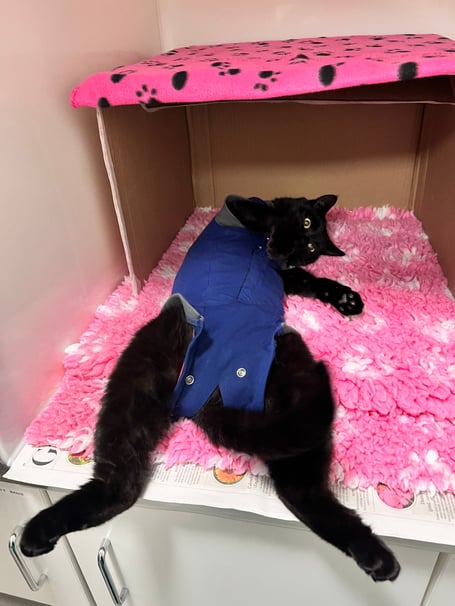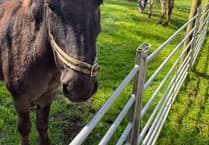The aptly named ‘Dart’ was brought into our Dartington surgery after her owners found her hiding under a chair with difficulty breathing. Dart presented with a high heart rate and a very rapid respiratory rate. There were no obvious physical injuries and so she was placed into our oxygen therapy kennel for stabilisation. This provides a constant, measured flow of oxygen and monitors the humidity and temperature, making sure patients are comfortable.
Our vet Alastair took an x-ray of Darts chest and also ultrasound scanned her heart. Whilst the heart looked normal, there was a lot of fluid in the space between the lungs and chest wall (known as a pleural effusion). This fluid needed to be drained under sedation to ease her breathing: we managed to remove 210 millilitres of fluid using a procedure called thoracocentesis. When examined under the microscope, the sample contained a large number of pus cells, leading to a diagnosis of pyothorax. Because the body can continue to produce this type of fluid, the best option for Dart was to have a chest drain placed (or two, in her case), which allowed us to regularly remove any excess build-up.
Dart was a super patient, who loved a fuss, and tolerated the regular draining and nurse checks performed during her stay with us. In fact, her favourite position was to lay on her back purring! Despite having a concoction of oral medications and antibiotics, Dart took it all in her stride and also modelled the South Moor Vets pet t-shirt like a pro, which stopped her pulling out her drains.
With regular draining and careful monitoring, Dart’s breathing gradually returned to normal. Once the amount of fluid being removed had reduced to a safe level, the drains were taken out.
Dart spent six days hospitalised in our cat ward and the whole nursing team became very fond of her upside-down antics. As a GOLD status, cat-friendly practice, we were pleased to see the measures we have put in place resulted in a very relaxed cat during her stay, who was a pleasure to look after!
After almost a week in our care, Dart was finally ready to return home a much healthier, happier cat. She has since continued to do very well and is now back to her usual adventurous self. Although the exact cause of a pyothorax is not always clear, it serves as an important reminder: if your pet’s breathing ever seems unusually fast or laboured, it is vital to seek veterinary attention as soon as possible.


-May--Adult-female-in-our-garden-June-(insets).jpeg?width=209&height=140&crop=209:145,smart&quality=75)


Comments
This article has no comments yet. Be the first to leave a comment.